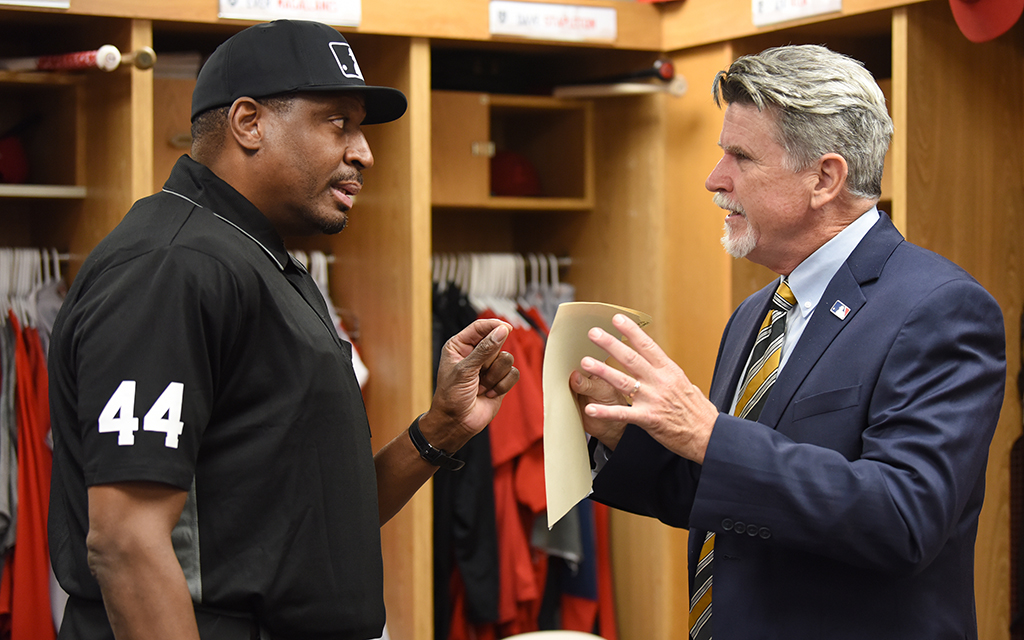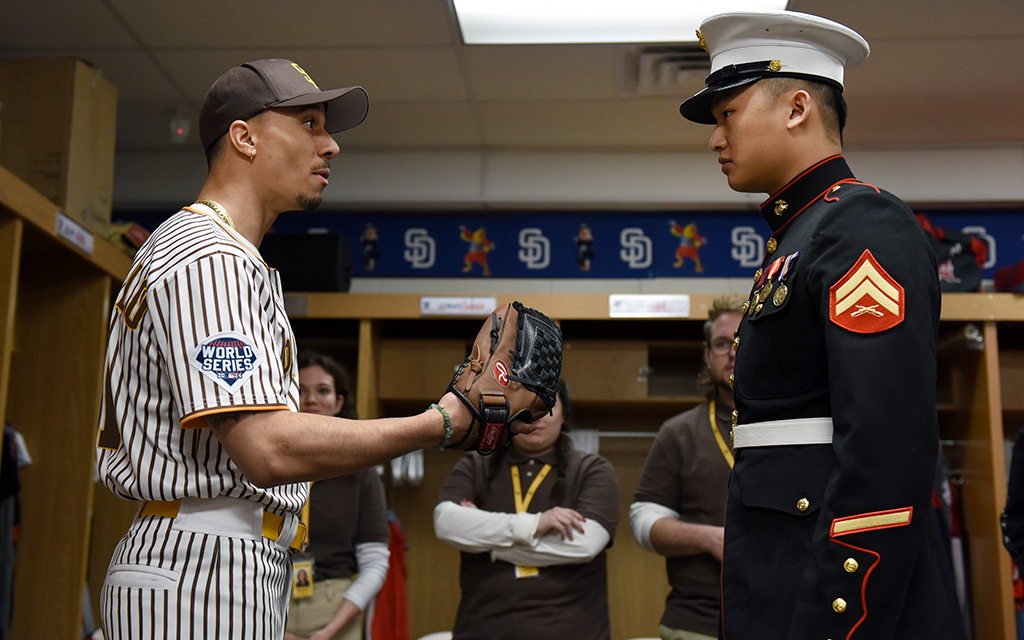
A major league umpire and the vice president of Major League Baseball discuss the consequences of Victor Castillo refusing to pitch in Game 7 of the 2024 World Series. (Photo courtesy of Tim Trumble)

Victor Castillo debates the pressures of living up to expectations in the final scene of “Safe at Home.” (Photo courtesy of Tim Trumble)
TEMPE – The play “Safe at Home” is one of the most unique shows to come through ASU’s theater program. Rather than the audience sitting down in seats, “tour guides” navigate the audience across nine scenes throughout Tempe Diablo Stadium. Ranging from public places like the stadium’s concourse and the men’s bathroom, to areas the average person rarely gets to see like the clubhouse and press box, it’s a viewing experience unlike any other.
It also tackles subjects not often seen during productions about sports.
Set during Game 7 of the 2024 World Series between the San Diego Padres and the Texas Rangers, it’s also taking place just a few days before the national election. A rumor surfaces that Victor Castillo, a star Dominican pitcher for San Diego, might take the mound but refuse to pitch in protest of a recent immigration policy.
“I don’t know if the authors (of the script) intended it to be done on a stage with a smaller cast where each time there was a new scene they changed the set, but when I read it I was like, ‘We gotta get a baseball stadium to do this,’” said Jack Reuler, the director of “Safe At Home.”
Reuler, a native to Minnesota, has directed five shows at ASU over a 20-year period that coincided with a 46-year run as the Artistic Director of Mixed Blood Theatre in Minneapolis. The Los Angeles Angels gave him permission to use their spring training site, while Tempe Diablo Stadium agreed to let Reuler and ASU use the facilities as the set for their production.

San Diego’s general manager and pitching coach discuss whether Victor Castillo should refuse pitch during the 2024 World Series in protest of an immigration policy. (Photo courtesy of Tim Trumble)
“It’s been a great collaboration between the city of Tempe and the Angels, the stadium, ASU and me as sort of a freelancer,” Reuler said.
Each actor stays in the same place reenacting their scenes as a new group of theatergoers are shown into each area of the ballpark. Actors have done their scenes nearly 200 times in preparation for their roles.
“It’s a fun, immersive baseball play which shows the humanity aspect of what it means to put yourself out there as a baseball player from the Dominican Republic, and also the weight and the baggage that comes with being in the spotlight, possibly being a beacon of hope,” said Tanner J. Conley, who plays Victor Castillo.
If Castillo goes against his beliefs and pitches in the game, he could garner a free agent deal worth $400 million dollars. If he abides by his values and doesn’t pitch, it could tank his value.
“I was definitely drawn to the idea of (Castillo) having to figure out who he is, especially with all this outside pressure and eyes on him constantly,” Conley said. “People are labeling him whatever they want like a troublemaker or other things that can damage one’s image, and he has to deal with that. He has to dig deep and find out who he is. I felt I really connected to that aspect of Victor.”
One of the most important aspects of the production is time. Each scene is supposed to take exactly seven minutes, with three minutes in between scenes for audiences to get to their next stop on the show. Timing everything perfectly is imperative to creating a cohesive story.
“You have to have your internal clocks perfectly timed (with the other actors) to make sure we’re on time without fail,” said Sheilah Utley, who plays the right hand-woman to the U.S. president.
Utley’s character, Andrea Leighton, is tasked with trying to convince the Democratic presidential candidate to backpedal her statements made about immigration policy, the policy Castillo is rumored to protest.
“If we go under seven minutes, then we have to improvise until the seven-minute mark is up,” Utley said. “And if we go over, then the audience has to leave without the information we need to give them in order for the show to progress.”
The show is about more than just immigration policy and sports. It tackles issues such as race, journalistic integrity, personal identity and the mistreatment of minor league baseball players, especially Latinos.
In one scene, the general manager and pitching coach argue about whether or not Castillo should pitch. The pitching coach, a former Dominican player himself, tells of his own experience with teams cheating his family out of money and the poor conditions teenagers are subjected to in Dominican baseball academies. Oftentimes prospects have to drop out of school to commit to baseball. At some camps in the Dominican Republic, 20 players can share a room with no running water. For many, the potential of a major league career represents the only chance to break the chains of poverty.
“If these camps existed in the States we wouldn’t allow it. We’d say, ‘No, you’re not going to ask these kids to drop out of school and screw themselves over for a slight chance at the big leagues,’” said Straton Rushing, the play’s dramaturg, or the position in charge of making sure all elements of a show are factual.

Victor Castillo is set to take the mound for Game 7, but will he pitch? (Photo courtesy of Tim Trumble)
“There is always going to be politics that crosses entertainment, especially with the involvement of these large baseball programs that have schools down in the Caribbean and the Dominican Republic recruiting kids from a young age,” Conley said. “Yes, it’s politics but you’re also dealing literally with human life.”
Those involved with the show want the audience to acknowledge these issues exist. They want spectators to realize baseball doesn’t reside in a little bubble, and that it’s a microcosm of the problems society faces at large. Whether they’re Castillo or the presidential nominee, or food vendors, a mascot or a conflicted fan in the restroom, they want the audience to understand what it’s like to step into each character’s shoes.
“They see the issues that are being presented, like the governor switching up based on poll numbers rather than the greater good, and you see the racial tensions of scene seven with the umpire and the Vice President of MLB,” Utley said. “And also seeing in scene two with the baseball team owner and the reporter, how easy things can get swept under the rug and how easy it can be for people to be bought by larger companies to stay silent and how wrong that is.”
Audiences seemed engaged and intrigued by what they viewed last weekend. There are no future show dates scheduled at this time.
“I think the play is doing its job by forcing people to think differently,” Rushing said. “It’s cool that we’re able to do this and that the people at Tempe Diablo were open to it. This is the sort of project many schools either don’t have the resources or don’t put in the effort to make happen.”

